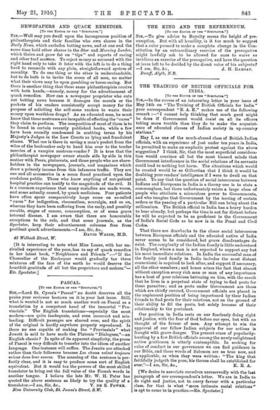THE TRAINING OF BRITISH OFFICIALS FOR INDIA.
[To THE EDITOZ OF THE ospireAroz."]
Sul,—In the course of an interesting letter in your issue of May 14th on "The Training of British Officials for India" your correspondent "E. A. K." makes use of the following remark :—" I cannot help thinking that much good might be done if Government would insist on all its officers taking more trouble than they do to make the acquaint- ance of educated classes of Indian society in up-country stations."
May I, as one of the much-abused class of British-Indian officials, with an experience of just under ten years in India, be permitted to make an emphatic protest against the above suggestion P I think, Sir, that the most superficial considera- tion would convince all but the most biassed minds that Government interference in the social relations of its servants could lead to nothing but harm. The situations which would be created would be so Gilbertian that I think it would be doubting your readers' intelligence if I were to dwell on that point. To say that the question of social intercourse between Indians and Europeans in India is a thorny one is to state a commonplace, but there unfortunately exists a large class of people who attribute a miraculous power to Governments, and who imagine that Government by the issuing of certain orders or the passing of a particular Bill can bring about the millennium. The British official in India has a heavy burden to bear already, but perhaps the time is not far distant before he will be expected to be as proficient in the Government of India's Social Code as he now is in the Penal and Civil Codes.
That there are drawbacks to the closer social intercourse between European officials and the educated native of India never seems to be considered, but grave disadvantages do exist. The complexity of the Indian family is little understood in England, where a man is not expected to support any but his most immediate relations. In India the successful man of the family (and family in India includes the most distant connexions) is required to look after, and support if necessary, all the other members ; and hence arises the fact that almost without exception every rich man or man of any importance has a host of poor relations battening on him, with the result that he lives in a perpetual state of trying to find posts for these parasites ; and as posts under Government are those which are chiefly coveted, Government officials are placed in the unpleasant position of being importuned by their Indian friends to find posts for their relations, not on the ground of their ability to fill the posts, but solely because of their relationship to the postulant.
Our position in India rests on our fearlessly doing right and justice, with the fear of God before our eyes, but with no thought of the favour of men. Any attempt to win the approval of our fellow Indian subjects for our actions is fraught with grave danger. The present craze of popularity- hunting by a few British officials among the newly enlightened native gentlemen is utterly contemptible. In seeking for rules of conduct in our governance we can find guidance in our Bible, and these words of Solomon are as true now, and as applicable, as when they were written : " The king that faithfully judgeth the poor, his throne shall be established for We desire to associate ourselves unreservedly with the last paragraph of our correspondent's letter. We are in India to do right and justice, not to curry favour with a particular class, for that is what "more intimate social relations" is apt to come to in practice.—En. Spectator.]






































 Previous page
Previous page